Following Labour’s worst election result in 85 years, what do pro-Labour students in Cardiff think were the main reasons for this?

Each election is an opportunity for politicians to present policies they believe in to the electorate and be held accountable to the mainstream population for their actions over the past few years.
Although Jeremy Corbyn led his party effectively in the last election with his message seeming to resonate, especially with younger voters, this was not the case in the December 2019 election.
This was despite the fact that Corbyn was still leader of the Labour Party and standing for many of the same policies as before, so what alienated him and his party to many ordinary Labour voters?
“I think the main reason Labour lost was because of the Brexit / Corbyn issue[s],” says Faye Burnell, a student at Cardiff University. “I think not making a decision and being vocal about it meant that people didn’t really know what his stance was.”
This was in stark contrast to Labour’s position in 2017 where, although many did not agree with the result of the referendum, they nonetheless agreed to respect the result of this referendum.
A YouGov survey taken after the election of almost 500 voters who had voted Labour in 2017 found the main cause of Labour’s defeat in their view was Jeremy Corbyn and the Labour leadership.
Labour supporters themselves created a toxic environment where they failed to realise you can’t insult and bully someone into agreeing with you, no matter how logical your argument, argues Beth Hugz.
“People also filled little bubbles and echo chambers, surrounding themselves with fellow Labour voters and getting more and more radical in discourse but less in action.”
“The right is actually presenting a warm and friendly and seemingly self-expressive environment for people.”
According to an internal Labour report following the party’s cataclysmic performance in the last election, it was not Jeremy Corbyn who was responsible but Brexit that played a decisive role in the Conservatives’ landslide.
The report, presented to the National Executive Committee (NEC), which governs Labour, said that “unrelenting” media attacks on the character of Jeremy Corbyn had a negative impact.
Josh Brown, a student at Cardiff Metropolitan University, suggests that Corbyn being vilified by the media as a terrorist, anti-Semite and just generally the bad guy was a contributing factor to Labour’s election defeat.

Alastair Cameron argues that the main causes of Labour’s loss of electability were Labour having no clear policy on Brexit, as well as offering straight up socialism which would immediately alienate a huge proportion of the electorate.
“The Labour Party needs to ditch full-on socialism and embrace Blairite social democratic policies again,” argues Cameron. “Its broken off into a civil war between the far left, [who are] unelectable, and the moderates”.
A general abandonment of their traditional voter base in order to pursue the votes of ill-advised students and those in the Capital is the main cause of Labour’s defeat, argues Harrison Staines.
He suggests that to regain the support of traditional Labour votes they simply need to return to the centre ground and focus on truly important issues rather than being ‘woke’ which is getting them nowhere.
This, as well as the issues of Brexit and the economic competence of their policies were the three main reasons for Labour’s electoral defeat.

“Momentum, which basically pulls the strings in the Party, needs to go away [and] Labour needs to stop telling the electorate what they ought to want.
Cameron purports that Keir Starmer is the best chance for Labour victory, but he was a Remainer so winning back the working class is contingent on the Conservatives making mistakes and alienating the electorate.
With Staines concurring, “Keir Starmer may have a chance, but the gap is too big to be breached in the next election to me.”
“Any candidate can win for Labour as long as they’re right of centre,” argues Hugz. “They’ll parade centrism, but they will just be Tories in red ties.”
“I’m sadly not convinced that Labour can win the next election regardless of the leader, they’ve alienated too many people,” says Burnell. “[None of the new candidates are] particularly well known or charismatic”.
Brown agrees with this sentiment, “I can’t see any of them winning an election, being a huge Labour supporter I did, and do, support Corbyn but the new Party leaders do not fill me with hope.”

Labour Party members can vote for the next Labour leader until April 2 2020.
